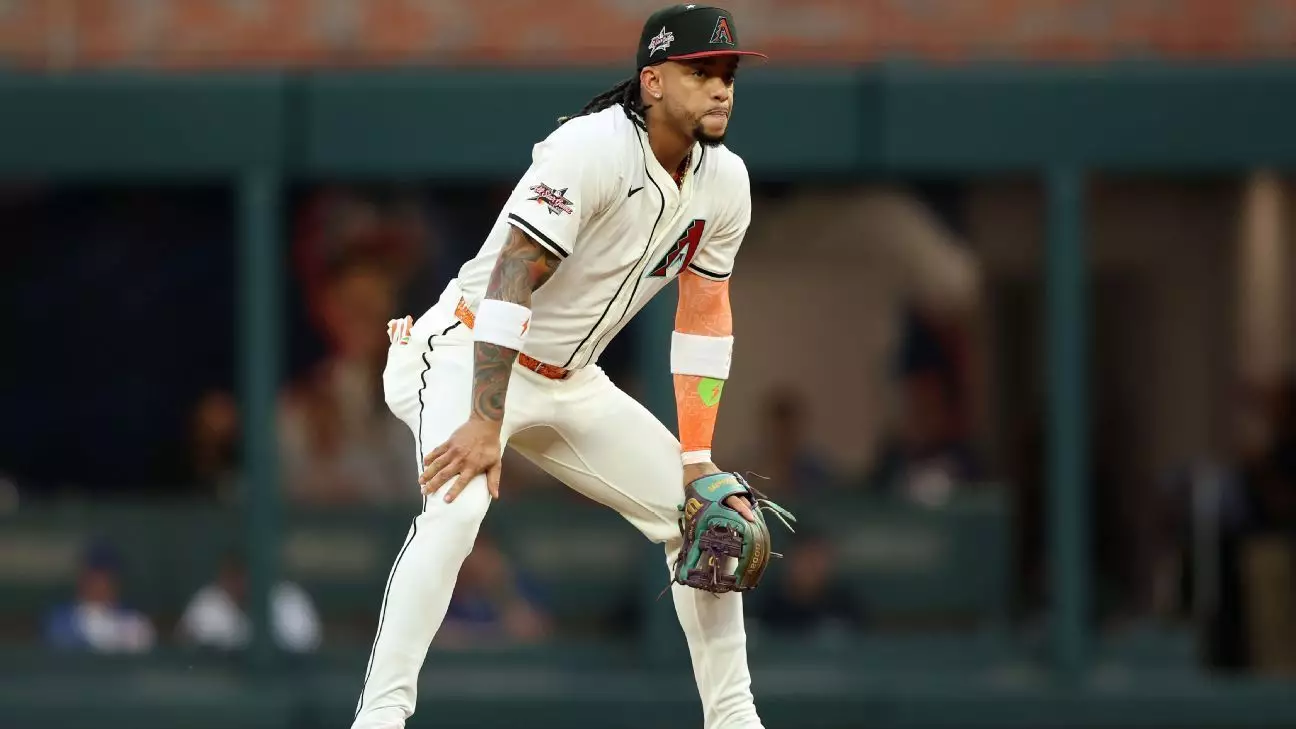In the contemporary landscape of professional sports, excellence on the field is often overshadowed by off-field narratives that shape fan opinions and team dynamics. Ketel Marte has demonstrated remarkable skill and consistency during this season, establishing himself as a pivotal figure in the Arizona Diamondbacks’ lineup. His offensive statistics—.297 batting average, 23 home runs, and 56 RBIs—are emblematic of a player at the top of his game, embodying the resilience and dedication that many athletes aspire to. Yet, despite these stellar numbers, Marte’s reputation has come under scrutiny, exposing the fragile nature of public perception in the world of high-stakes baseball.
The criticism directed at Marte reveals a broader cultural tendency to scrutinize personal decisions and off-field conduct, often without regard to context or adversity faced. Fans and analysts alike may demand unwavering commitment, overlooking the human complexities behind a player’s actions. Marte’s recent absences, which he attributes to injury and personal distress stemming from a burglary at his home, have been politicized, casting doubts on his professionalism. Such judgments reflect a tendency to equate availability with effort, ignoring the nuanced realities that many athletes navigate behind the scenes.
Human Vulnerability in a Competitive Environment
What sets Marte’s story apart is his willingness to publicly acknowledge vulnerability amid a highly competitive, pressurized environment. When he apologized for missing games and explained the circumstances—his burglarized residence and emotional turmoil—he demonstrated a commendable level of transparency that many athletes shy away from. It’s a reminder that even at the elite level, players are human beings subject to personal struggles and setbacks.
His candid admission challenges the conventional narrative of stoic professionalism and instead presents a more holistic view of what it means to be a modern athlete. Critically, manager Torey Lovullo’s support underscores an understanding within the organization that mental and emotional well-being can influence performance just as much as physical health. Lovullo’s praise for Marte’s honesty and effort signals an important cultural shift—acknowledging vulnerability as strength rather than weakness.
Furthermore, Marte’s situation highlights the importance of empathy in sports. His struggles and subsequent explanations serve as a reminder that athletes’ off-field realities can affect their on-field contributions significantly. The narrative should not be reduced to a simple question of games missed but should instead recognize the complex interplay of personal adversity and professional obligation.
Trajectory of Team Success and the Cost of Personal Choices
The ripple effects of Marte’s absences extend beyond personal reflection, directly impacting the Arizona Diamondbacks’ season trajectory. Coming into the season with high expectations, the team’s inconsistencies have been partly attributed to the lack of full-strength participation from key players like Marte. The club’s recent losing streak after his return exemplifies how individual absences can influence collective outcomes, especially in a tightly contested playoff race.
Yet, it’s important to reject a narrative that blames Marte solely for the team’s struggles. The organizational response—trading away key players prior to the deadline—reflects a broader sense of instability and search for solutions. The front office’s decisions, motivated by the team’s sliding position, reveal how personal issues and on-field performance are intertwined in complex ways. The decision to trade players like Merrill Kelly and Randal Grichuk indicates a strategic pivot fueled by recent setbacks, but it also raises questions about the long-term mental health and resilience of the team.
Ultimately, Marte’s season embodies the paradox faced by many professional athletes: the need to perform at the highest possible level while contending with personal challenges that can threaten their focus and consistency. His case invites a reevaluation of how fans, media, and even organizations measure resilience—not just through game stats, but also through the unseen struggles that accompany a full life.
Challenging the Narrative: Personal Growth Amidst Criticism
Criticism of Marte’s missed games and off-field behavior often ignores the broader context of personal growth and mental health awareness sweeping through professional sports. By openly addressing his circumstances, Marte exemplifies a new era where transparency and vulnerability are not viewed as liabilities but as essential components of a human-centric approach to excellence.
Furthermore, his experience serves as a catalyst for change within the team environment, fostering a culture where issues can be discussed without fear of undue judgment. While critics focus on the immediate impact—missed games, team struggles—there is greater value in recognizing the importance of supporting athletes through personal hardships. Such support not only enhances individual well-being but ultimately benefits organizations that seek sustainable success.
Marte’s story underscores a vital lesson: true resilience lies in facing adversity head-on and allowing oneself room to be imperfect. In a sport obsessed with perfection, his openness is a beacon for change—embracing human frailty as a pathway to deeper strength and understanding. As baseball continues to evolve, stories like Marte’s will challenge us to reevaluate what it truly means to be a dedicated, resilient athlete.

